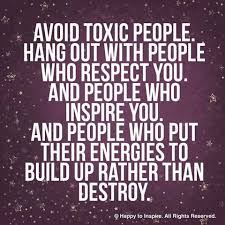Family dynamics can be a source of comfort, support, and love, but unfortunately, not all family members contribute positively to these aspects. Dealing with a toxic family member can be challenging and emotionally draining. However, it's essential to prioritize our own well-being and establish boundaries to protect ourselves. In this blog post, let us explore effective strategies to avoid toxic individuals within our family while striving to restore harmony within the family unit.
Recognize the Toxic Behavior: The first step in managing a toxic family member is acknowledging the toxicity of their behavior. This can involve identifying patterns of manipulation, constant criticism, gas-lighting, play victim or emotional abuse. Awareness empowers you to take necessary steps to protect yourself and your loved ones.
Set Boundaries: Establishing clear boundaries is crucial for preserving your emotional well-being. Communicate your limits assertively, ensuring your toxic family member understands the consequences of crossing those boundaries. This may involve limiting contact, avoiding certain topics, or setting specific rules for interactions as well as avoiding social media status. Remember, boundaries are not meant to punish or exclude but to safeguard your mental health.
Seek Support: Coping with a toxic family member can be overwhelming. Reach out to supportive family members, close friends, or professionals like therapists or counselors who can offer guidance and provide a safe space to express your feelings. Remember, you don't have to face this challenge alone.
Practice Self-Care: Self-care becomes crucial when dealing with toxic family members. Engage in activities that bring you joy, reduce stress, and promote your well-being. This can include exercise, hobbies, spending time with positive friends, or exploring mindfulness techniques. Prioritizing self-care will help you maintain your emotional balance while navigating challenging family dynamics.
Foster Healthy Relationships: While avoiding toxic individuals, it's important to nurture positive relationships within your family. Strengthen bonds with supportive family members who respect your boundaries and offer a safe environment. Focus on cultivating healthy connections that contribute to your overall happiness and well-being.
Communication and Conflict Resolution: If you decide to address the toxic behavior directly, approach the conversation with caution and empathy. Choose an appropriate time and place to discuss your concerns calmly and assertively. Use "I" statements to express your feelings and avoid blaming or accusing language. Consider involving a mediator, such as a family therapist, to facilitate open and constructive communication.
Acceptance and Letting Go: In some cases, despite your best efforts, toxic family members may not change their behavior or acknowledge the impact they have on others. It is crucial to accept that you cannot control their actions or choices. Learning to let go of the need for their validation or approval can be liberating. Focus on your own growth, happiness, and the relationships that bring positivity into your life.
Conclusion: Managing a toxic family member is undoubtedly a challenging endeavor. By recognizing toxic behavior, setting boundaries, seeking support, practicing self-care, fostering healthy relationships, and employing effective communication, you can create a healthier family dynamic. Remember, your emotional well-being should always be a top priority, and by taking proactive steps, you can establish a harmonious and nurturing environment for yourself and your loved ones.
For further reading about 6 types of toxic people, go to https://dailyinfographic.com/types-of-toxic-people



